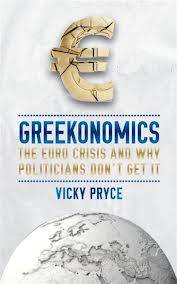Alcidi, Cinzia, Giovannini, Alessandro, Gros, Daniel, (2012), ‘Grexit’: Who would pay for it?’, www.ceps.eu, 25 May. The eurozone countries are currently sitting on an aggregate exposure to Greece exceeding €300 billion. If the country were to exit the eurozone, it would certainly not be able to service its debt in the short run when the exchange rate overshoots. Over the longer run, however, the exchange rate is likely to return to a …Read More
Who is Responsible for the Greek Tragedy?
El-Erian, Mohamed, (2012), ‘Who is Responsible for the Greek Tragedy?’, www.project-syndicate.org, 19 May. Greece is following the road taken by several other crisis-ridden emerging economies over the past 30 years. Indeed, as I argued earlier this year, there are stunning similarities between this once-proud eurozone member and Argentina prior to its default in 2001. With an equally traumatic implosion – economic, financial, political, and social – now taking place, we …Read More
Labour market developments in Europe 2012
Greece needs plans for growth, not eurozone exit
Katsikas, Dimitris, (2012), ‘Greece needs plans for growth, not eurozone exit’, www.publicserviceeurope.com, 23 March. The second bail-out agreement for Greece has been hailed by the political elites in Europe and the parties of the Greek governing coalition as a historic achievement that paves the way for the country’s return to normalcy. Nonetheless, as soon as it was signed, a number of analysts criticised it as insufficient and predicted that in …Read More
The Logic and Fairness of Greece’s Program
Blanchard, Olivier, (2012), ‘The Logic and Fairness of Greece’s Program’, blog-imfdirect.imf.org, 20 March. Some countries have been able to work down heavy public debt burdens. Those that were successful did it through sustained high growth. But in Greece’s case, it had become clear that high growth—let alone sustained high growth—was not going to come soon enough.
What Is It About Greece?
Stevis, Matina, (2012), ‘What Is It About Greece?’, blogs.wsj.com, 9 March. The Greek debt restructuring, now in its final stretch, is “being as closely watched as a U.S. presidential election,” a market participant quips. But, why, one might ask, are people prepared to put themselves through the process of memorizing acronyms, learning about complicated legal maneuvers and following what has been an exhausting process, if they’re not getting paid to do …Read More
Greek Economy and the Crisis; Challenges and Responses
Petrakis, Panagiotis, (2012), Greek Economy and the Crisis; Challenges and Responses, Springer. The book “The Greek Economy and the Crisis. Challenges and Responses” targets all those who think about the present and future of this (culturally) long-lived small geographic region (Greece), to form a personal view of its social and economic problems. A society that repeats the same types of behaviour over the centuries does not do so due to random …Read More
Greekonomics: The Euro Crisis and Why Politicians don’t get it
Pryce, Vicky, (2012), Greekonomics: The Euro Crisis and Why Politicians don’t get it, Biteback Publishing. Economist Vicky Pryce reflects on the current crisis in the Euro Zone its causes and how Europe has responded, and offers her thoughts on what might and what needs to happen if the Euro is to survive in its current form. She pays particular attention to Greece, the country of her birth, the country first …Read More
If Greece goes…:The impact of a Greek default on Europe and the world economy
Financial Times, (2012), If Greece goes…;The impact of a Greek default on Europe and the world economy, Penguin Books. The Financial Times, the global business newspaper, has led the field with its coverage of the eurozone crisis and Greece’s political and financial chaos. As the chances of a Greek exit from the eurozone grow, the FT’s specialist correspondents and authoritative columnists dissect the potentially devastating consequences for businesses and governments …Read More
Sovereign Debt Restructurings 1950-2010; Literature Survey, Data, and Stylized Facts,
IMF, (2012), Sovereign Debt Restructurings 1950-2010; Literature Survey, Data, and Stylized Facts, IMF Working Papers, Monetary and Capital Markets Department, Washington. This paper provides a comprehensive survey of pertinent issues on sovereign debt restructurings, based on a newly constructed database. This is the first complete dataset of sovereign restructuring cases, covering the six decades from 1950–2010; it includes 186 debt exchanges with foreign banks and bondholders, and 447 bilateral debt …Read More







